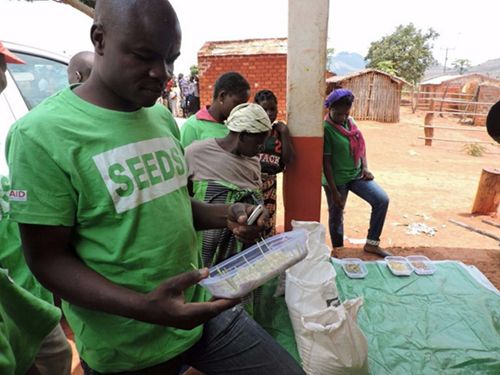
Bringing seeds and inputs to farmers in rural areas can be costly and difficult. In order to reach as many farmers as possible, NCBA CLUSA has developed local market seed fairs, which take advantage of farmers gathering at market to demonstrate the benefit of improved seeds and other planting improvements such as fertilizer sales and financial service opportunities.
NCBA CLUSA’s SEEDS project, funded by USAID, raises private sector investments from two commercial seed companies—Phoenix Seeds in Zambézia province and Oruwera Seed Company in Nampula province—to provide expanded access to quality certified seeds, inputs and agricultural services for 10,000 smallholder farmers in Northern Mozambique.
One of the largest limiting factors to Mozambican agricultural productivity is the limited use of certified seeds. Of the 90,000 tons of seed planted in Mozambique every year, only 10 percent is certified seed. The remaining 90 percent is simply grain retained by farmers from one year to the next. NCBA CLUSA’s 20 years’ experience working in Mozambique has demonstrated that smallholder demand exists for certified seeds and inputs—the challenge is distribution and access.
On average, Mozambican farmers need to travel 50 miles (80 km) to the nearest seed store, yet when they arrive the store has likely sold out. If available, the seed is frequently old, a low-yielding variety or uncertified, and the product is not packaged in “smallholder friendly” small bags appropriate for smaller farm sizes. Farmers are unlikely to have enough funds to purchase the whole inputs “package” (fertilizers, etc.) alongside the seed, which are needed to optimize the effects of investing in certified seed.
The SEEDS project aims to bring certified seeds and inputs closer to smallholder farmers by establishing rural seed and inputs retail systems managed by networks of community based agro-dealers known as Community Based Service Providers (CBSPs)—a tried and tested model used by NCBA CLUSA throughout programs in Senegal, Zambia and Uganda. SEEDS identifies local dynamic entrepreneurs and supports them to operate as successful small businesses selling farmer-sized packets of seeds and inputs, training them in business management, marketing, advertising, branding (SEEDS agents’ stores can be immediately identified in the communities by their distinctive green and SEEDS logo), retail strategies and customer service.
CBSPs are only one of many sales strategies SEEDS and its two private sector partners are implementing to reach as many farmers as possible. Distribution of any product in Mozambique is costly and logistically challenging, particularly for a rural, price-sensitive product aimed at clients accustomed to receiving government and NGO subsidized seeds. To compliment sales made directly from CBSP agent-owned stores, SEEDS supports Phoenix and Oruwera in developing complimentary and innovative sales and distribution strategies, including mobile community seeds and inputs fairs throughout Zambezia and Nampula provinces. The fairs are not stand-alone events but take place at existing rural market days (taking advantage of high visibility) or other strategic rural locations where significant farmer interest exists for seeds. Weekly markets at Murrimo can draw up to 1,000 people.
CBSP agro-dealer agents are responsible for stimulating smallholder demand in their communities prior to the fairs through their stores and demonstration plots, and are compensated for their efforts through a commission for every kilogram of seed sold to smallholder famers at the fairs. SEEDS has seen some dealers make as much as $15 in commission in one morning. Taking advantage of the high quality seed, other small and medium agribusinesses are also able to take the opportunity to associate with quality product.
With music, sound systems and attendance from project partners (such as Banco Oportunidade de Moçambique for financial services, input supplier MozFert for fertilizer and NCBA CLUSA PROMAC demonstrating conservation agriculture techniques and applying for land titles), the seed fairs are becoming a dynamic focal point for local communities during the inputs sales period, with each event attended by more than 600 smallholder farmers.
Currently, Phoenix seed fairs have generated over 10 tons of maize and pigeon pea sales in addition to 1 ton of fertilizer sales, enough to plant 500 hectares of land. The events are set to continue through the inputs season in March 2016. In the future, the fairs will respond to a wide range of community needs, providing a platform for other agriculture-related sales including water pumps and solar panels.
Through SEEDS activities, the names Phoenix and Oruwera Seed are becoming synonymous with quality seed. The word of mouth, referred to as “bush telegraph,” is quickly spreading the news that it is possible to access quality seeds and inputs in local communities at an affordable price.


